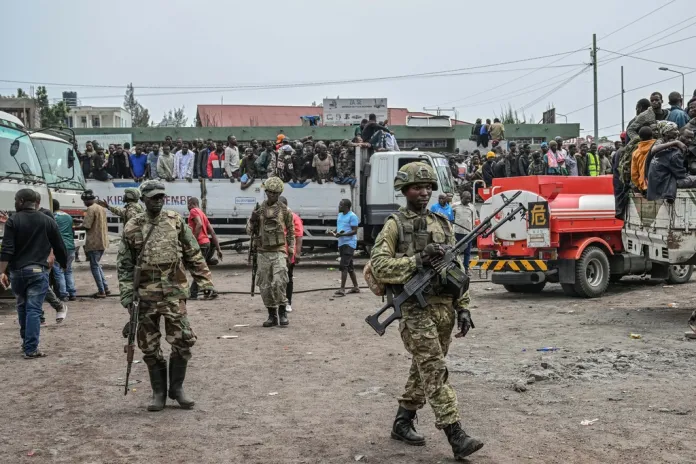New Monkeypox Cases Explode in African Hot Spot
Congo is currently facing a significant increase in Mpox (formerly known as monkeypox) cases, reporting over 1,000 new infections in just one week. This rise has prompted African health authorities to urgently request additional vaccines to combat the outbreak, which the World Health Organization (WHO) has classified as a global emergency. Mpox, related to smallpox, generally causes milder symptoms and is primarily spread through close contact.
Congo accounts for a staggering 94% of the total 18,910 reported cases across Africa this year, with the health system likely underestimating the situation due to limited testing. In response to the alarming caseload and a new variant of the virus identified in the country, the WHO has emphasized the need for international support, particularly in providing vaccines.
Despite pledges for 215,000 doses from the EU and other donations, health officials warn that Congo needs about 3 million doses to effectively control the outbreak. Past global efforts have been criticized for favoring wealthier nations, and South African President Cyril Ramaphosa has called for equitable access to diagnostics and vaccines. Kaseya from the Africa CDC stressed the urgency for international solidarity and support, particularly to avoid restrictive travel bans that could further isolate affected countries.
Congo reported more than 1,000 new Mpox cases in the last week up to Tuesday as African health authorities asked for desperately needed vaccines to help fight its “growing” threat on the continent. The World Health Organization has declared the outbreaks in Africa a global emergency.
Mpox belongs to the same family of viruses as smallpox, but causes milder symptoms like fever, chills and body aches, and mostly spreads through close skin-to-skin contact, including sexual intercourse. People with more serious cases can develop lesions on the face, hands, chest and genitals.
While Mpox has been reported in 12 of Africa’s 54 countries during these outbreaks, the vast central African nation of Congo has recorded by far the most cases this year. Out of a total of 18,910 cases in 2024, 94 percent — or 17,794 — were in Congo, the Africa Centers for Disease Control and Prevention said, with 535 of the 541 deaths reported.
The figures are likely an underestimate, as only about one in five suspected cases in Congo are being tested for Mpox. Africa CDC director-general Dr. Jean Kaseya said many affected African countries had limited testing and surveillance capabilities.
Over the last seven days, Congo recorded 1,030 of the 1,405 new cases in Africa according to statistics provided late Tuesday by the Africa CDC. Only 16 percent of the cases have been confirmed by virus tests, but the infections meet the agency’s definition of the disease.
The rising Mpox case count in Africa and a new form of the virus identified in Congo that might be more easily transmitted led the WHO to declare it a global health emergency last week. Some hope this will encourage donors to vaccines and other help to curtail the outbreaks in Africa before cases spread internationally as Sweden recorded a case of the new Mpox variant first seen in eastern Congo.
The WHO has previously said its past efforts to raise donations for Mpox failed to elicit even a single donor dollar.
Africa CDC’s Kaseya said that his organization had received a pledge of 215,000 Mpox vaccines from the European Union and the vaccine maker, Bavarian Nordic, which were due to arrive in the next few days. The United States’ aid agency said it had donated 50,000 other doses of the same vaccine to Congo. Japan has also donated some doses to Congo.
But Africa likely needs much more. Congo’s health minister said his country alone needed 3 million vaccine doses to end the outbreaks there, which have spilled into at least four nearby African countries.
A 2022 global Mpox outbreak in more than 70 countries was shut down in the space of months with vaccines and treatments made available in rich nations, but hardly any doses reached Africa. It had been spreading largely unnoticed for years in Nigeria and elsewhere before it sparked international concern. Since then, the virus has continued to steadily sicken people in Congo, with few effective containment efforts.
South African President Cyril Ramaphosa criticized the global response to the 2022 outbreak, calling it unfair as treatments and vaccines were made available to rich Western nations while Africa was given little support. In a statement, he urged the international community to guarantee “equitable access” to Mpox diagnostics and vaccines this time.
Ramaphosa’s comments evoked memories of Africa’s anger at largely being shut out of vaccines during the COVID-19 pandemic. Then, Africa received doses much later than richer countries and had to pay more in some cases.
Kaseya said Mpox was now “growing and spreading” while countries waited for doses. While Congo was clearly the country causing the most concern, he said it was noticeable that cases in nearby Burundi had more than doubled to 572 in a week.
Kaseya also asked for “solidarity” from the international community in dealing with Mpox and specifically urged against any COVID-like travel bans being placed on African countries that would isolate them as the disease is not as easily transmissible.
“Don’t punish Africa,” he said. “We need you to provide appropriate support. This vaccine is expensive.”
The Western Journal has reviewed this Associated Press story and may have altered it prior to publication to ensure that it meets our editorial standards.
" Conservative News Daily does not always share or support the views and opinions expressed here; they are just those of the writer."




